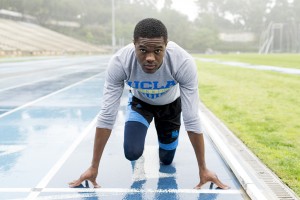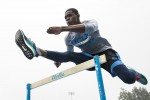Halfway through his first collegiate track and field season, one of the top sprinters in the country found himself hobbling around campus with a boot on his right foot.
Calls from his coach went unanswered, rehab appointments were skipped.
Now-sophomore sprinter Rai Benjamin was to be one of the most potent and impactful freshmen UCLA track and field had seen in years. Personal bests of 46.37 in the 400-meter and 21.05 in the 200-meter made him one of the fastest high school seniors in the country in 2015.
“My first impression of him was that he was good … he’s a big, long, strong, fast athlete,” said sprints coach Darrell Smith. “He wasn’t caught up in his own ego … he was impressive.”
But before he fought his way to a first-team All-American finish, his first year was nearly spoiled by a string of injuries that kept him from practicing for the majority of the season.
In his first ever collegiate outdoor meet, Benjamin ran with a broken foot, thinking it was only a bone bruise. He took second place in the 200-meter with a time of 21.29.
An X-ray taken the following week revealed the severity of the injury – a fracture of the fifth metatarsal in his right foot, the long bone on the outside that connects to the little toe. The fracture would become the most serious injury Benjamin would have to contend with in his career to date.
“He was built for track and field in terms of his physique,” said senior sprinter Leon Powell. “When I first heard of (his injuries), I got nervous for the upcoming season because we were already pretty low on bodies.”
Benjamin’s injury put him on a growing list of inactive sprinters for the early part of 2016 season. Both junior Joe Herrera and senior Jonny Moniz, to name a few, were suffering from their own injuries leaving the sprinting team without three of its top runners.
Benjamin’s fracture would normally keep a runner out for 10 weeks – almost the entirety of an outdoor track season. That meant he would not run with any of the three sprint relay teams that he’s a part of this year, and would not be able to score a single point for UCLA in the most competitive part of the outdoor season.
“It sunk in that I really just messed this whole thing up. I really wasted an entire year,” Benjamin said. “Certain things were expected of me.”
With rehab and training there was a chance that Benjamin could come back to try and qualify for the NCAA championship, but the injuries posed an emotional burden on top of the physical one.
“I went through this dark stage … there were times where I was so stressed I wouldn’t even go to rehab,” Benjamin said. “I wouldn’t answer the phone calls I was getting from coach … it was really depressing.”
Benjamin credited his mother for motivating him again.
“One day I was talking back and forth with my mom and she was telling me that it’s how you deal with adversity that really defines you as a person and defines your character,” Benjamin said. “From that point on I flipped a switch, started doing the little things … I was out there every day.”
Starting in early April, Benjamin took rehab more seriously, adjusted his diet and attended practice just to see his teammates.
Early in May, another X-ray revealed that Benjamin’s toe had healed significantly. He was cleared to run less than eight weeks after his initial diagnosis and only one week before the Pac-12 championship meet.
“Because he was out for so long, common sense thing said redshirt,” Smith said. “Load up for next year, don’t burn a year, and that was our position.”
Smith and director Mike Maynard had several conversations with Benjamin warning him of the pitfalls of rolling the dice on an end-of-season comeback. He was risking an entire year of athletic eligibility on just one race, and the coaches made sure he knew it.
“I had the option to redshirt and people were telling me to,” Benjamin said. “But honestly I didn’t want to do it. I felt like I could come back.”
The Pac-12 championship was Benjamin’s only opportunity to qualify for the NCAA Western Regionals, the very last meet before the NCAA championship.
“I kind of went into the conference meet with Rai holding my breath at the start of the first round not knowing what would come,” Smith said. “And then of course you’re in Seattle, it was 58 degrees and raining, so I’m thinking in my head, ‘Huge mistake … we’re about to burn a redshirt for nothing.'”
Benjamin ran a 52.21 in his first collegiate 400 meter hurdle race, qualifying for the Division I West Preliminaries in just one attempt and beating the cutoff time by just under two seconds.
Still, the uphill battle was not over.

A lack of confidence in his foot combined with a tweaked back, caused by a misstep during his first full week of practice since his fracture, meant he would only have to work harder to get to where he needed to be.
“At practice, I was going 100 percent every single rep. Those two weeks were the worst I ever felt in my entire life,” Benjamin said. “After practice I would walk back to my room and legit drop dead … I couldn’t do anything else for the rest of the day.”
At Western Regionals, thunderstorms and lightning pushed the sprinting events so far back that the decision was made to put the top three sprinters from each heat through to nationals. Benjamin would have to place in the top three in just one more race, instead of running a preliminary and a final, to make it to the championships.
Benjamin won his heat with a time of 50.88 in the 400-meter hurdles, and punched his ticket to the NCAA championship.
“I was a little surprised but I knew he had the capability to do it,” Smith said. “The question was always just, physically, could he pull it off? And he did.”
Two weeks later, Benjamin found himself in Eugene, Oregon. With a grand total of two races, three injuries and four weeks of full practice under his belt, he had made it to college’s biggest stage. The only thing left to do was exactly what he wanted at the outset of 2016 – to run.
“We got to the track the day of finals and I didn’t say a word (to coach). He knew (my back) was so hurt,” Benjamin said. “When I stepped out onto the track just the atmosphere turned it on, and the adrenaline started running and slowly the pain subsided.”
Benjamin had cemented himself 49.82 seconds later as the sixth fastest 400-meter hurdler in the country that year after what can only be described as a roller coaster season.
“I wasn’t as fit as everybody else … But after the race I was like, ‘Dude you just came in sixth at NC’s off three races,’” Benjamin said. “I’m ready this year, last year was kind of a fluke. Now I have the whole season ahead.”
Benjamin has already broken the UCLA school record in the indoor 200-meter with a time of 20.76 and he also owns the third fastest time in UCLA indoor history in the 400-meter at 47.11.
Now that Benjamin is healthy again he has redoubled his efforts at practice so that his teammates strive to be the best that they can be, Smith said.
That’s all part of his plan.
“He wants his teammates with him when he goes to nationals,” Smith said. “He wants to win.”
